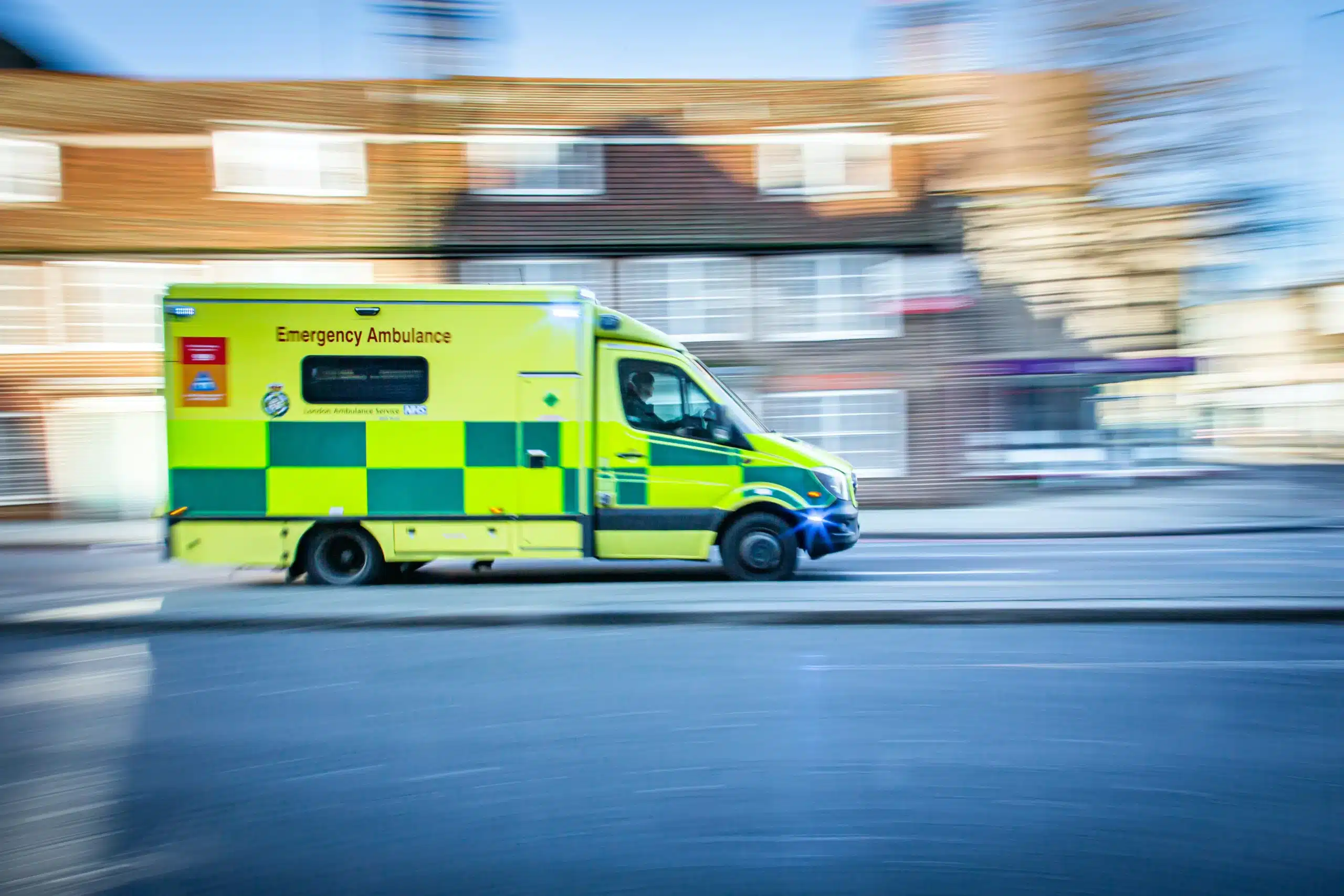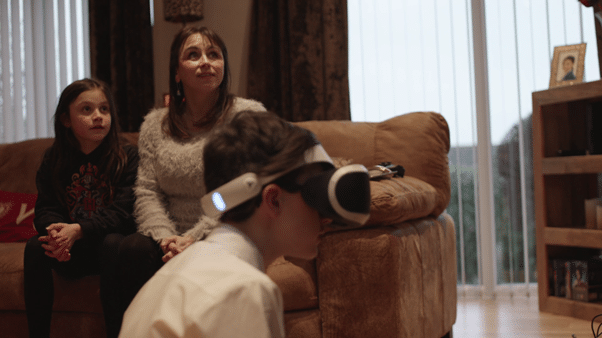
 " alt="">
" alt="">
Ambulance Negligence Claims

Reviewed by
Peter Rigby - Managing Director of Medical Negligence | Last updated on: 7th March, 2025
We've got your Ambulance Negligence Claim covered
- No win No fee
- Not just lawyers - real specialists
- No obligation
- UK's highest-rated medical negligence solicitors
Ambulance services play a crucial role in providing urgent medical care and transportation during emergencies. When paramedics or ambulance services fail to meet their duty of care, there can be significant consequences for patients. In these cases, affected individuals or their families may have grounds to make an ambulance negligence claim.
Due to the increasing pressure on the NHS, ambulance negligence is becoming an even more urgent issue. At Patient Claim Line, we understand the impact ambulance negligence can have on your health and future. Our experienced team of medical negligence professionals is dedicated to supporting and guiding you through your ambulance negligence claim, ensuring you get the justice you deserve.
What is ambulance negligence?
Ambulance negligence is when medical care provided by the paramedics or ambulance services fall below standard. This can involve errors or lapses in judgement made by the ambulance crew during transportation, treatment or decision-making leading to complications or even fatalities that could have been avoided.
Find out if you
have a claim
Take the 10-second claim test
Free Advice
03300 080 352
claim form
We're the highest-rated No Win No Fee medical negligence solicitors on Trustpilot
Types of ambulance negligence claims
There are various types of ambulance negligence claims you can make. Some common examples include:
Ambulance delays claim
Delayed ambulance response times are a frequent cause of negligence claims, especially when they result in the deterioration of a patient’s health or prevent timely treatment. If an ambulance response was delayed unnecessarily and you suffered as a result, you may have a claim.
Failing to equip an ambulance correctly claim
Ambulances must be equipped with the necessary tools and medical equipment to treat patients during transport. If the ambulance is not properly equipped, such as missing essential medical supplies, oxygen tanks or defibrillators, this can lead to further harm. All ambulances should be stocked and double-checked before leaving the bay, failure to do this is ambulance negligence.
Poorly trained paramedics claim
Paramedics must be highly trained and capable of making crucial decisions under pressure. If paramedics are poorly trained or lack the necessary skills, they may fail to properly assess a patient’s condition or make medical errors that lead to harm. In these cases, a claim may be made against the ambulance service for their failure to provide adequately trained staff.
Misdiagnosis by ambulance staff claim
Misdiagnosis is a common issue in emergency care and can have serious repercussions. Ambulance staff must quickly assess the severity of a patient’s condition and administer appropriate treatment. If paramedics misdiagnose a medical condition, this can delay necessary and proper care.
Administering incorrect medication claim
Administering the wrong medication or the wrong dosage can have severe consequences. If incorrect medication is given and causes harm, this is considered negligence.
Causes of ambulance delays
Ambulance delays during a medical emergency are a real problem. Here are some common causes of delays:
- NHS staff pressures
- High demand for ambulance services
- Lack of NHS funding
- Insufficient staff training
- Lack of equipment or resources
How long is acceptable to wait for an ambulance?
The acceptable wait time for an ambulance depends on the severity of the medical emergency. With the current state of the NHS and escalating pressures, ambulance response times can range from as fast as a few minutes to as long as a few hours. With time-sensitive medical emergencies, ambulance delays can be seriously dangerous or life-threatening.
What are the risks of ambulance or paramedic delays?
Delays in ambulance response times or paramedic treatment can have serious consequences, especially in emergency situations. Delays can lead to a serious decline in medical state, permanent injuries or disabilities, psychological trauma or an increased risk of death. In many cases, a delay can lead to severe complications that could have been avoided with prompt medical attention.
Can I claim against the ambulance service for compensation?
Yes, if you have suffered harm due to ambulance negligence, you can claim compensation. Our solicitors are here to ensure that you receive the correct compensation for your ambulance negligence claim. To find out if you have a claim, contact us today.
What type of injury or illness can I claim for?
There are many injuries and illnesses you can claim for when claiming compensation for ambulance negligence, for example:
- Stroke misdiagnosis
- Cauda equina misdiagnosis
- Brain injury negligence
- Sepsis negligence
- Amputation
- Long-term disabilities as a result of negligence
- PTSD
- Blood clots and aneurysms
- Cardiac arrest and heart attacks
- Severe allergic reactions
- Serious bleeding
- Organ damage
- Death
How much compensation could I receive?
The compensation you may be entitled to depends on individual circumstances, taking into consideration the extent of your injury, its long-term effects and any financial losses incurred. Ongoing medical treatment, lost wages and the impact on your daily life are all taken into account when determining the compensation value. The more serious the injury and its implications, the higher the amount.
How do I start my ambulance negligence claim?
To start your claim, you need to gather as much evidence as possible to support your case, including medical records, any correspondence with the ambulance service, and witness statements. Our solicitors at Patient Claim Line who specialise in medical negligence claims will help you navigate the legal process.
The steps involved in making an ambulance negligence claim
Once you have gathered all the appropriate information and evidence, your medical negligence solicitor will do the rest.
Step 1: Seek Medical Advice
The first step is to ensure that you receive appropriate medical care for any injuries or worsened conditions resulting from ambulance negligence.
Step 2: Contact A Specialist Medical Negligence Solicitor
It’s crucial to consult a solicitor who specialises in ambulance negligence. Our experts at Patient Claim Line work on a No Win No Fee basis and will help assess your case, provide expert advice and guide you through the legal process.
Step 3: Obtain Medical Records
Your solicitor will gather your medical records to assess the extent of the harm caused and determine if you have a valid claim.
Step 4: Send a Letter of Claim
The solicitor will send a letter of claim to the responsible party, notifying them of the negligence and the intent to seek compensation. Once received, the negligent party will have up to four months to provide a written response.
Step 5: Receive a Response from the Insurer
The insurance company will respond to the letter of claim. They may accept liability, deny it or offer a settlement. Your solicitor will help you evaluate their response.
Step 6: Issuing Court Proceedings (If Necessary)
If the claim cannot be settled out of court, your solicitor may issue court proceedings to continue the legal process and seek compensation for your injuries.
Can I make a no-win, no-fee claim?
Yes, at Patient Claim Line we operate on a ‘NO WIN NO FEE’ basis to prevent any financial burdens on those who have suffered so that you can focus on recovery. This makes it easier for individuals to pursue claims without the financial risk of paying upfront costs.
Legal assistance for Ambulance Negligence Claim?
At Patient Claim Line we have more than 100 solicitors with a combined experience of over 400 years. We specialise in ambulance negligence claims, ensuring our clients receive the justice and financial support they deserve. Our expert team will work tirelessly on your behalf to secure the best possible settlement for your case.
It’s not enough to use a solicitor who sometimes covers medical negligence. You need solicitors who know medical negligence through and through. We deal exclusively in medical negligence cases and are experts in the field.
Meet Our Medical Negligence Team
Contact Our Medical Negligence Team
Frequently asked questions about ambulance negligence claims
Our Expert Legal Team Answers Your Questions About Making An Ambulance Negligence Claim
Just like any compensation claim, an ambulance negligence claim can affect your current benefits. This is because your payout is classified as an asset. Whether your benefits are affected or by how much is dependent on the value of the payout. Placing your financial payout in a Personal Injury Trust within 52 weeks of receiving it is a way you can protect your legal compensation.
For more information, head to the GOV.UK website.
The length of time it takes to settle an ambulance negligence claim varies depending on the complexity of the case, the willingness of the other party to settle and whether court proceedings are required. On average, most claims are settled between 18 months to two years. This is only a guideline as straightforward cases with liability admitted might be quicker, while more complex cases with disputed liability could take much longer.
Not all claims go to court. According to the most recent reports from the NHS, 81% of medical negligence cases were settled without court proceedings. Many ambulance negligence cases are settled out of court through negotiations. However, if a settlement cannot be reached, your solicitor may need to proceed with court action.
Meet our ambulance negligence team
Case Study
Sarah's Story
"Now we have peace of mind"
My husband, Nick, went back and forth to the doctors for a long time and tried everything the doctor recommended. But his illness got worse, to the point that he was in agony.
In the end we got so desperate that we asked for a referral. The doctor was reluctant, so we had to consult a private hospital. That’s when we found out there was a tumour. It took years from the onset of his illness to finally start cancer treatment.


He used to be a man with a lot to live for, but in the end he was in so much pain that he withdrew from the family. He became angry that nobody had helped him sooner, and the legal team were able to give him the validation that he was desperately seeking. The NHS confirmed if they had done more, Nick would still be alive today.




